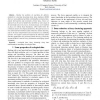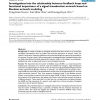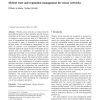56 search results - page 4 / 12 » Quantitative Measures for Evaluating Knowledge Network Node ... |
BMCBI
2006
13 years 7 months ago
2006
Background: Existing biological databases support a variety of queries such as keyword or definition search. However, they do not provide any measure of relevance for the instance...
EUSFLAT
2009
13 years 5 months ago
2009
Besides the problem of searching for effective methods for extracting knowledge from large databases (KDD) there are some additional problems with handling ecological data, namely ...
IPPS
2003
IEEE
14 years 1 months ago
2003
IEEE
We describe a peer-to-peer self-organizing overlay network for our global computing system. The preliminary simulation results show that the network has some smallworld characteri...
BMCBI
2007
13 years 7 months ago
2007
Background: A number of studies on biological networks have been carried out to unravel the topological characteristics that can explain the functional importance of network nodes...
WINET
2010
13 years 6 months ago
2010
Wireless sensor networks are characterised by the distributed nature of their operation and the resource constraints on the nodes. Trust management schemes that are targeted at sen...



